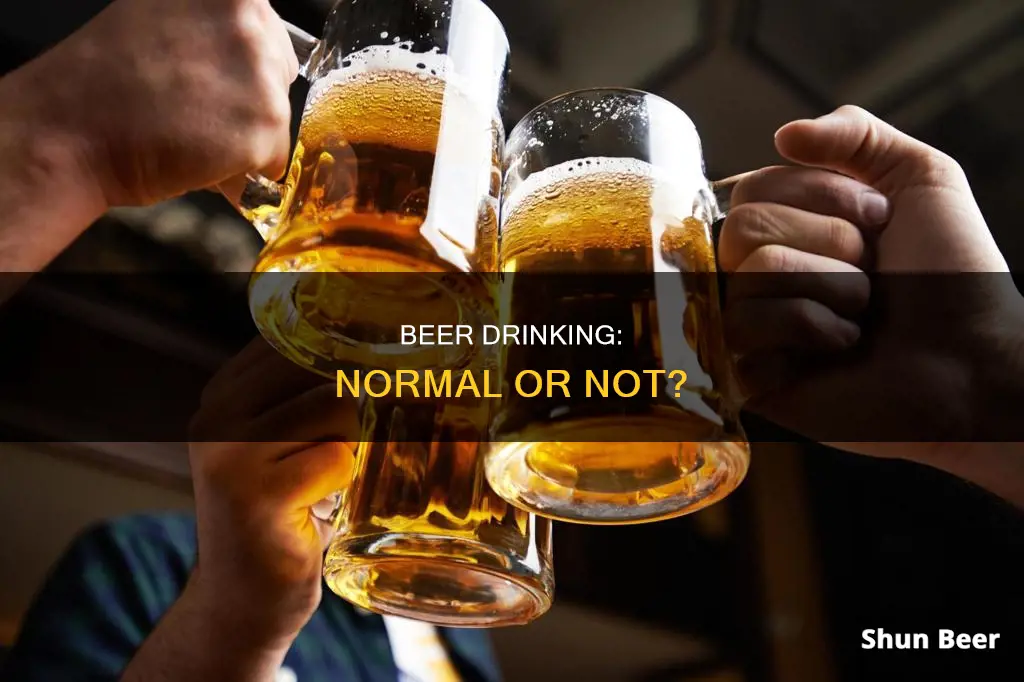
Drinking beer is a common way to unwind for many people. In 2021, the US beer industry generated around $109 billion in revenue, with an average consumption of 68 litres per person in a year. Beer is widely available due to its low alcohol content, with many varieties containing less than 5% ABV. While it may be a popular beverage, drinking beer, or any alcoholic drink, every day can have negative consequences for both immediate and long-term health. The effects of alcohol on sleep, weight loss, digestive health, kidney function, and the risk of chronic diseases are well-documented. However, some studies suggest potential benefits of moderate beer consumption, including improved bone density, gut health, and lipid levels.
| Characteristics | Values |
|---|---|
| Perceived as weird | Drinking beer through a straw |
| Taste | Bitter |
| Health effects | Dehydration, disrupted sleep, slowed reflexes, impaired balance, memory and sleep, intestinal inflammation, abdominal pain, bloating, diarrhoea, alcoholic fatty liver disease, increased risk of chronic diseases |
| Positive effects | Increased bone mineral density, improved gut health, better lipid levels |
What You'll Learn

Is drinking beer through a straw weird?
Drinking beer through a straw is considered unconventional and elicits varied responses from onlookers, ranging from amusement to judgement. Some people find it strange and even psychopathic, while others are indifferent, encouraging people to enjoy their beer however they prefer.
Historically, straws were invented by the Sumerians around 3000 BCE specifically for drinking beer. Ancient beers were dense and particulate-laden, so straws were used to avoid floating particles and sediment. Straws also enabled drinking from shared vats, fostering a social drinking experience and contributing to the formation of societies. Over time, straws became a symbol of social status, adorned with precious materials like gold.
Today, drinking beer with a straw is uncommon, and when observed, it often serves a practical purpose. For example, individuals with physical challenges or dental issues may find it more accessible to drink beer through a straw. Others may use a straw to avoid messing up their lipstick or to discreetly consume beer in settings where it is not allowed or socially acceptable.
Using a straw can alter the drinking experience as it bypasses the nose, reducing the orthonasal and retronasal smelling that contributes to the overall taste perception. Additionally, drinking through a straw can increase the speed of consumption, which may be desirable for those seeking to get drunk faster. However, this can also lead to ingesting more carbonation, potentially resulting in vomiting.
Ultimately, the decision to drink beer through a straw is a matter of personal preference. While it may be viewed as unusual by some, it has a rich history and can offer practical benefits to certain individuals.
Beer and Prozac: Safe Mix or Risky Business?
You may want to see also

Is it weird to drink beer in bed?
Firstly, beer is known to have a strong aroma, and drinking it from the can or bottle means you might miss out on this aspect of the experience. Some beer enthusiasts consider it essential to savour the aroma and get their "nose down there next to the beer". However, if you're just looking to quench your thirst or enjoy a casual drink, this may not be a priority for you.
Secondly, drinking beer in bed could potentially lead to spills and stains, especially if you tend to drink quickly or move around a lot during sleep. Beer can also be dehydrating, so it's important to have a glass of water handy to stay hydrated and potentially avoid a hangover, as dehydration is a contributing factor.
Additionally, it's worth noting that drinking beer, or any alcoholic beverage, can affect your sleep quality. According to a study published in JMIR Mental Health, even light drinking during the day can result in a decrease in sleep quality. So, if you're someone who values a good night's rest, drinking beer right before bed may not be the best idea.
Finally, while beer is widely consumed and easily accessible, it's important to remember that excessive drinking can have negative health consequences. As with any alcoholic beverage, moderation is key. The CDC recommends limiting daily intake to two drinks or less for men and one drink or less for women.
In conclusion, whether it's weird to drink beer in bed is subjective. As long as you're mindful of potential spills, sleep disruption, and health considerations, there's no inherent harm in enjoying a beer in the comfort of your bed.
Santa's Favorite Beverage: Beer or Not?
You may want to see also

Why do people hate the taste of beer?
When you first search "is it weird to drink beer?", one of the first auto-complete suggestions is "why do people hate the taste of beer?" and it's a very valid question. Beer is one of the oldest and most widely consumed alcoholic drinks in the world, yet it's also one of the most divisive. While some people passionately appreciate the complex flavors of beer, others find the taste utterly repulsive. So, why do so many people dislike the taste of beer?
The primary reason is often simply a matter of taste preference. Our taste buds are unique, and we all have different sensitivities to bitter, sweet, and sour flavors. Beer is generally characterized by its bitter notes, which come from the hops used in brewing. For some, this bitterness is refreshing and pleasing, while for others, it's overwhelming and unpleasant. Individual thresholds for bitterness may play a significant role in whether someone enjoys the taste of beer or not.
Additionally, the diverse range of flavors in beer can be off-putting to some. Beer can have earthy, grassy, or even fruity notes, depending on the style and ingredients used. These complex flavors can be appreciated by some as nuanced and intriguing, but they might also be seen as strange or unappealing to those who are unfamiliar with them. For example, the yeasty, bready flavors of a hefeweizen or the tartness of a sour beer might be unwelcome surprises to someone expecting a more straightforward, neutral taste.
Another factor is the carbonation and mouthfeel of beer. The fizziness of beer can be a turn-off for some, especially those who prefer smoother, less effervescent drinks. The sensation of carbonation on the tongue can be intense, and for those who are sensitive to it, it might detract from the overall drinking experience. Furthermore, the body and texture of beer vary greatly depending on the style, and some may find certain beers too thin or too thick for their liking.
Cultural and social influences also play a part in shaping our taste preferences. In many cultures, beer is deeply ingrained in social rituals and traditions, which can positively influence our perception of its taste. Conversely, negative associations with beer, such as witnessing excessive drinking or experiencing peer pressure to consume it, can also shape our attitudes and preferences. Social context can greatly impact how we perceive the taste of beer and whether we learn to appreciate it or not.
Lastly, for some people, the aversion to beer may be rooted in past negative experiences. Beer has a relatively low alcohol content compared to other spirits, but it can still be easy to overindulge, leading to unpleasant hangovers. A bad experience with drinking too much beer can turn someone off from the taste and smell of it altogether. Additionally, for those with sensitive stomachs, the carbonation and ingredients in beer can sometimes cause discomfort or even nausea, further reinforcing a negative association with the drink.
Hunting Island State Park: Beer Drinking Rules Explained
You may want to see also

What happens to your body when you drink beer every day?
Drinking beer is extremely common, with the beverage making up over 55% of all alcohol consumed in the US. While having a beer now and then is fine for some people, and there is even some research to suggest it has health benefits, there is also evidence that any alcoholic drink, even in small amounts, should be avoided.
Weight Gain
An average 12-ounce beer has around 150 calories, and as the alcohol percentage rises, so does the calorie count. Drinking two or more beers could add more than 300 calories to your diet, which can affect your weight. Alcohol may also decrease your ability to feel satisfied after a meal, stimulate your appetite, and activate food reward centres in the brain, leading to increased calorie intake.
Kidney Problems
The kidneys filter blood, and drinking too much alcohol can put you at risk for hypertension, which can lead to kidney disease. Beer is also a diuretic, which means you could be putting extra strain on your kidneys. Drinking alcoholic beer can impair your electrolyte balance, increasing the risk of muscle cramps, weakness, or fatigue.
Heart Health
There is no doubt that heavy drinking damages the heart, increasing the risk of high blood pressure, type 2 diabetes, atrial fibrillation, and stroke. However, drinking moderate amounts of beer does not have the same effect and may even be beneficial for the cardiovascular system. A 2018 study found that beer, both with and without alcohol, had a protective effect relating to the prevention of LDL (bad cholesterol) oxidation due to its HDL cholesterol antioxidant capacity.
Sleep Disruption
Alcohol can affect the brain's communication pathways and its ability to process information. Sleep can be impaired even by light drinking, with a 2018 study finding that men who drank two or fewer servings of alcohol, and women who drank one or fewer, experienced a 9.3% decrease in sleep quality.
Cognitive Decline
Research has shown mixed results regarding the impact of beer consumption on cognitive decline. A 2016 study found that those who drank more hard liquor were at risk of faster cognitive decline, while beer, especially those high in hops, may be better for brain health due to its antioxidants and ability to reduce neuroinflammation. However, a 2017 UK study did not find that low amounts of drinking protected cognition and instead found that heavy drinking increased the risk of dementia and Alzheimer's disease.
Bravo Capsule and Beer: A Safe Mix?
You may want to see also

Is it weird to not like beer?
It is not weird to not like beer. In fact, many people share this sentiment due to the bitter taste of beer. This is because the bitter taste of beer triggers evolutionary wiring in our brains, designed to keep us away from potentially dangerous food and drink. This trigger is stronger in some people than in others due to genetic variations.
Beer's bitterness comes from the alpha and beta acids found in hops, as well as the low concentrations of ethanol. These bind to three out of the 25 bitter receptors in our taste buds, sending a strong signal of bitterness to the brain. This can be unpleasant for some people, especially those with a high number of taste buds, who are more likely to detest hoppy beers.
Additionally, the carbonation in beer activates our "cold" receptors, which also have genetic variations. This can further contribute to some people finding beer unappealing. While some people enjoy the taste of beer, it is not unusual to dislike it due to its bitterness and other factors affecting the drinking experience.
However, it's important to note that drinking culture and social norms might make it seem unusual to some people if someone doesn't enjoy drinking beer. Beer is widely consumed and easily accessible, with a low alcohol by volume (ABV), and it is often associated with social gatherings and relaxation. As a result, someone who doesn't like beer might feel out of place or unusual in certain social contexts. Nonetheless, it is entirely normal and valid to have different preferences when it comes to beverages, including beer.
Hot Beer: Healthy or Hazardous?
You may want to see also
Frequently asked questions
Drinking beer is very common. In 2021, the US beer industry made $109 billion in revenue, with consumers drinking an average of 68 litres (18 gallons) that year.
Drinking beer, like any alcohol, can be bad for your health, both immediately and long-term. Alcohol affects your reflexes, balance, memory, and sleep. It can also cause dehydration, digestive issues, and weight gain.
Some studies have found that drinking beer can increase bone mineral density and lower the risk of hip fractures. Beer also contains fermented compounds that may benefit gut health.
Beer is widely available due to its low alcohol by volume (ABV). Many beers are under 5% ABV, making them sellable in grocery stores, even in states with strict liquor laws. Beer is also often drunk for the feeling of relaxation and euphoria it can induce.
The taste of beer is bitter, and some people are more sensitive to bitter flavours than others. This is due to genetics, which influences how our brains process bitter-tasting and cold beverages.







